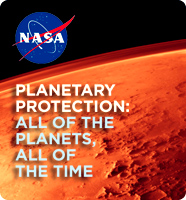-
Planetary Science Decadal Survey
Dear Colleague:
This is the first of what will be a regular series of newsletters to the astrobiology community regarding the 2009-2011 Planetary Science Decadal Survey. We all get too much email, so I’ll try to keep these concise!
The key points in this newsletter are these:
1) The decadal survey will establish the priorities for planetary exploration in the U.S. for the coming decade.
2) Astrobiology is a major crosscutting theme of NASA’s planetary science activities and a central facet of the survey’s scientific scope.
3) The process is just getting started, and will...Source: [National Academies Space Studies Board]
-
NASA Astrobiology Website is Official Webby Honoree
The NASA Astrobiology Program website has been selected as an Official Honoree of the 13th annual Webby Awards! The International Academy of Digital Arts and Sciences presents Webby Awards and names Official Webby Honorees in 70 categories spanning art, health, music, and science. Of nearly 10,000 entries to the competition, fewer than 15% were selected as honorees, and the NASA Astrobiology Program website shares this year’s distinction in the category of Website/Science with ten other websites including the likes of Seed Magazine, the California Academy of Sciences, and...
-
Invisible Yellowstone
Research conducted in Yellowstone National Park by astrobiologists from NAI’s Montana State Team is highlighted in the 30-minute film Invisible Yellowstone, produced by MSU’s Thermal Biology Institute and MSU’s Science and Natural History filmmaking program. The film is available on DVD by contacting Daniella Scalice at daniella.m.scalice@nasa.gov
-
NPR's Science Friday on Origins of Life and the Universe
National Public Radio’s Science Friday broadcasted live from Arizona State University on Friday, April 3rd as part of their Origins Symposium. The symposium, which inaugurated ASU’s new Origins Initiative, featured world renowned scientists Stephen Hawking, Steven Pinker, Richard Dawkins, and Craig Venter. The Science Friday broadcast included two panels: Physicists and the Origin of the Universe, and Origins and Evolution of Life. Listen to the archive here.
-
NASA's 21st Annual Planetary Science Summer School
NASA is accepting applications from science and engineering post-docs, recent PhDs, and doctoral students for its 21st Annual Planetary Science Summer School, which will hold two separate sessions this summer (20-24 July and 3-7 August 2009) at the Jet Propulsion Laboratory in Pasadena, Calif. Applications are due 1 May 2009.
During the program, student teams will carry out the equivalent of an early mission concept study, prepare a proposal authorization review presentation, present it to a review board, and receive feedback. At the end of the week, students will have a clearer understanding of the life cycle...
-
Fragments of Asteroid Impact are Collected and Analyzed

Never before has an asteroid been both telescopically observed while in space, and then collected and analyzed after it’s hit the Earth. NAI astrobiologists from the Carnegie Institution of Washington and the SETI Institute are part of the large, interdisciplinary team of scientists who undertook the investigation. Their results are published in a recent issue of Nature.Analysis of the carbon content in the fragments of 2008 TC3, as it is known, showed it to be mostly graphite-like, indicating that at some point in the past, the body had been subjected to extremely...
-
"The State of Astrobiology, 2009" A report from Mary A. Voytek, Senior Scientist for Astrobiology (Interim), NASA Headquarters
March 27, 2009 – The Astrobiology Program is in good health for program year 2009, with a budget of $49.5 million dollars and a full slate of ongoing and new initiatives promising a continuing stream of discoveries. We have two 50th anniversaries to celebrate over the next year: NASA funding of its first exobiology experiment in 1959, and the establishment of the Agency’s Exobiology Program – progenitor of the Astrobiology Program – in 1960. These anniversaries provide good opportunities to reflect on the accomplishments of exobiology and astrobiology at NASA and the future of our rapidly growing field...






